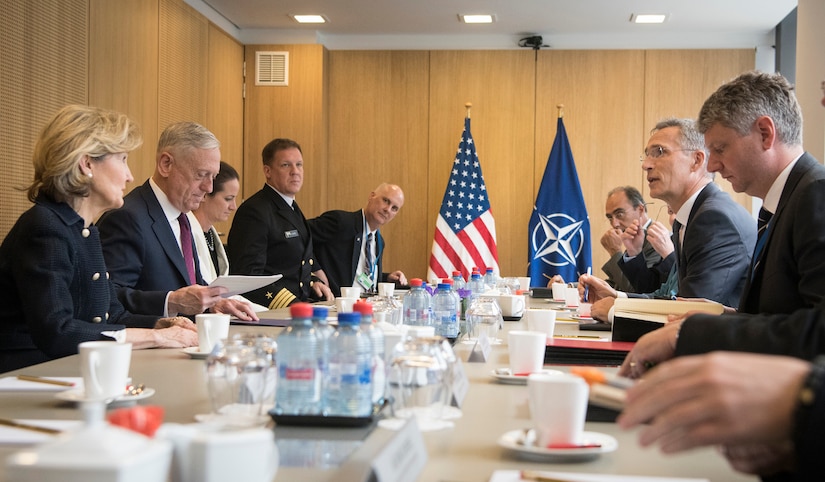By Terri Moon Cronk, DoD News, Defense Media Activity
WASHINGTON -- Threats to collective security have not waned,
whether from terrorism or Russia’s aggression and hybrid threats, Defense
Secretary James N. Mattis said at NATO headquarters in Brussels today.
In the global fight against the Islamic State of Iraq and
Syria, the U.S.-led coalition “will continue to carry out operations necessary
to crush the physical caliphate and prevent a resurgence of ISIS,” the
secretary said at a news conference following a NATO defense ministers meeting.
“We will be unrelenting in our effort, working with
like-minded nations. We will target ISIS around the world, for this remains a
global fight,” he said.
And to support those efforts, NATO is transitioning its existing
activity in Iraq into a sustainable training mission, the secretary said.
“In concert with the new Iraqi government, we will
capitalize on Iraq’s success and reinforce their long-term counterterrorism
efforts,” Mattis said. “We cannot allow ISIS or any other terrorist group to
terrorize the people of this region, again driving thousands of refugees from
their homes and into Europe and elsewhere.”
Resolute Support
On NATO’s Resolute Support mission in Afghanistan, NATO’s
steadfast commitment and the implementation of the U.S. South Asia strategy
have renewed stabilization efforts, now including additional, significant
development funding from India, the secretary said.
“Afghan security forces continue to improve,” he said,
adding that all six Afghan corps are deployed throughout the country,
demonstrating Afghan resolve while their government pursues a stable, inclusive
order for its people with NATO support.
“The level of confidence today is sufficient for [Afghan
President Ashraf Ghani] to announce a temporary cease-fire for the end of
Ramadan, offering the Taliban an opportunity to bring to an end this fighting
and providing the world a clear demonstration of his government’s and our
alliance’s commitment to peace and an Afghan-led, and an Afghan-owned peace
process.”
Burden Sharing Improves
The secretary said NATO nations have stepped up their
defense spending and reversed a three-year downward spiral, with 100 percent
participation in 2017. “We also saw an across-NATO increase in military
spending in a quarter century” last year, he added.
“Now, in 2018, eight nations are already meeting the 2
percent [of gross domestic product in defense spending] pledge benchmark, and I
salute the 15 allies who are on track to reach 2 percent by 2024,” Mattis said.
Many allies are making investments beyond the monetary
aspect of contributions, he noted. “I appreciate the troops and the leadership
these nations provide to support NATO’s Kosovo [and] Afghanistan forward
presence and other missions,” Mattis said.
“With [NATO Secretary General Jens Stoltenberg’s] capable
leadership, we also continue to improve the speed of political decision
making,” the secretary said. “Coupled with building NATO’s military readiness,
speed of alliance consultation and decision making [provide] a credible
deterrent to any who would threaten our democracies.”
European Union Partners
Mattis said the alliance’s defense ministers also engaged
European Union partners on security cooperation and military mobility. “[With]
our defense cooperation with the EU, NATO recognizes effective deterrence and
defense depends on a transparent dialogue between us,” he said.
“We also recognized that uncoordinated investments that
waste resources or duplicate alliance efforts undercut our collective
deterrence and defense posture, so we found further areas for cooperation and
alignment,” he said.
“[For] nearly 70 years, the NATO alliance has served to
uphold the values and the principles on which our democracies were founded,”
Mattis said. “The American people remain committed to this alliance, and we
look forward to working together to sustain our core function -- the collective
defense of our people -- while fostering peace and security.”









No comments:
Post a Comment